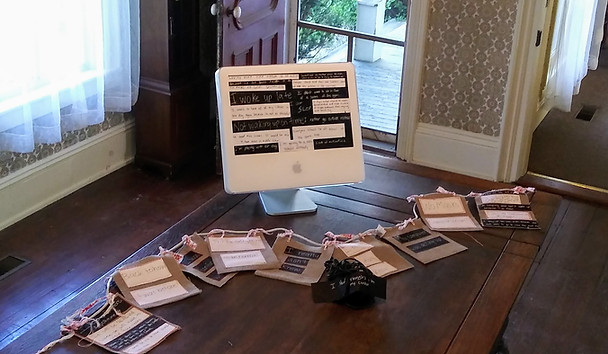
Donations are Appreciated. The AACHM is a non profit 501c3 organization.
Dr. George Jewett, Michigan's True Renaissance Man
Architect Hilyard Robinson and the Parkridge Homes Community
AACHM@1528:Where Art Meets History
The African American Cultural and Historical Museum of Washtenaw County is located at 3261 Lohr Road in Ann Arbor, MI and has Free admission.



Woodlawn Cemetery Restoration
In 1946, Pastor Garther Roberson Senior purchased a plot of land in Ypsilanti to provide a resting place for Black community members when there were few options due to discrimination and racism. Woodlawn Cemetery, the only documented Black cemetery in the County, has since fallen into disrepair.Initial research indicates that Woodlawn Cemetery has served as the final resting place for over 150 African Americans whose lives were central to the development and history of Ypsilanti and broader Washtenaw County. Historic burial records, including grave locations, were lost in a fire sometime in the 1950s-1960s. Utilizing historic newspapers, death certificates, and other gray literature, approximately 61 individuals have been identified as Woodlawn Cemetery burials. Over the years, the cemetery has faced environmental degradation and the natural effects of time.
This Restoration Project includes the necessary steps to preserve and protect the historic cemetery for future generations while maintaining its historical integrity. This project is made possible through the collaborative efforts of multiple organizations: Washtenaw County Historic District Commission, the African American Cultural and Historical Museum of Washtenaw County, and Ypsilanti Township, the Roberson Family, and descendants of family members for whom Woodlawn Cemetery was their final resting place to restore the site.


Black History Moments
In partnership with the African American Cultural History Museum of Washtenaw County, WEMU honored Black History Month each day in February with a Black History Moment that recognized significant contributions to Washtenaw County by the African American community. Black History Moments are archived here where you can listen anytime.
ONLINE EXHIBIT - “Hold Me Up” Narrative Histories of Black Community Building in Ann Arbor and Ypsilanti, 1920s-1970s. This project features five narrative histories of Black communal, institutional and political life in Ann Arbor and Ypsilanti from the 1920s through the 1970s. Each account centers a particular topic: experiences of childhood, Black religious institutions, adult education and the importance of Black History, battles over racial inequality in housing, and Black Power institution building. The project builds upon and honors the storytellers and institutions that have long centered Black communities in the history of Washtenaw County (indeed, you can find a list of those important institutions and projects on the homepage). While students drew from the rich collections of the Bentley, they also relied significantly upon digitized materials from the Ypsilanti Historical Society, Ann Arbor District Library and the African American Cultural and Historical Museum of Washtenaw County (AACHM).
Five undergraduate fellows (Krista Albetins, Isabella Buzynski, Paige Hodder, Miriam Saperstein and Bennett Walling) collaborated with Greg Parker (Public Engagement Manager), Eshe Sherley (Doctoral Candidate, History) and UM Assistant Professor Jennifer Dominique Jones, Ph.D to create a public history project that expands the topical scope of the Michigan in the World Program. Given the reverberations of COVID 19, a significant portion of the Bentley Historical Library’s holdings had to be digitized prior to the start of the program. Sarah McLusky and Cinda Nofziger generously helped to survey the collections, while Brian Williams shared his expertise about and access to African American Alumni files. The digitization team scanned newspaper articles, photographs, correspondence, organizational records and a very fragile scrapbook from the 1930s so that students could access the documents remotely. Their labor and generosity combined with the generous support of Terry McDonald, Director of the Bentley- was instrumental to the project’s success.
Covid 19 Pandemic Stories - Telling Tales Out of School
The Student Advocacy Center of Michigan’s annual social justice art project elevates the recent experiences of their students. This 2021 project was like none other, because this year is like none other. Students are struggling. They are hurting. Virtual school is temporary for most, but many Student Advocacy Center youth have been forced into virtual settings for many, many years. For this project, SAC students were given two questions to answer:

The artist family Anna Oginsky (Heart Connected}, Sarah Richards (Ananda Wellness) and their mom, Kathleen Hodges turned these answers into art.


They re-purposed "found" computers and parts and covered them with the messages of reflection and hope from SAC students. This photo of the piece for the AACHM was taken in the dining room of the David R. Byrd Center on Lohr Road.
The historic farmhouse is more than 150 years old, built on land that was platted in 1825 and was restored by David and Letitia Byrd.
The tools of school were
a slate and chalk, so visually similar to the black and white tools our students use today.

Join our email newsletter!
Stay connected with AACHM to get the latest updates, events, and stories.
